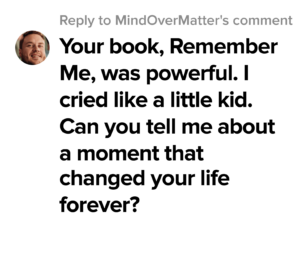
Some moments stay with us forever. This was mine. Thank you for connecting with Remember Me. 💔
~Sanela
© Sanela Ramic Jurich
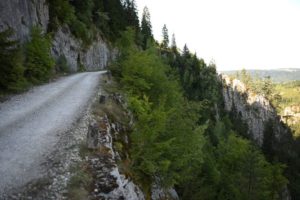
We took just a change of clothing with us. My father’s friend told us not to bother bringing anything else, because it would be taken away anyway. He was there to show us which truck was the safest one for us. My father had to go sit at the front of the truck with other men, and my mother and I sat in the back with women. It was so crowded; I half-sat on mother’s lap. They covered the truck with some brown tarp and off we went.
It was an unbearably scorching August day, the air thick with a suffocating heat that clung to our skin like a second layer. We were crammed together, pressed against one another like frightened animals seeking refuge, yet there was no escape from the oppressive closeness. The stench of sweat mingled with the acrid smell of fear as we huddled beneath a tattered tarp, trying to shield ourselves from the harsh sun that beat down mercilessly.
In that stifling darkness, my stomach churned with a mixture of nausea and anxiety. The bag that held our final remnants of belongings became my reluctant confidante, bearing witness to the physical and emotional turmoil within me. I retched into it, my body betraying me as the revulsion and dread threatened to overwhelm every fiber of my being.
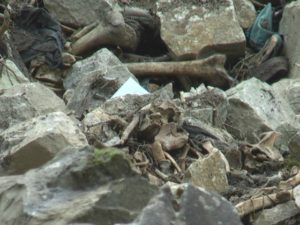
Amidst the agony of the moment, a different kind of urgency surfaced—my desperate need to relieve myself. The very core of my being seemed to ache with the necessity, as if every discomfort I felt was a microcosm of the larger suffering we were enduring. Each passing second felt like an eternity, my bladder aching as if it held not only my own desperation but the collective weight of our shattered lives.
A little while later, we stopped moving. An armed soldier peeked in, waving his gun. He demanded someone to come out and be his helper. After a few torturous moments of hoping and praying I wouldn’t get to be the chosen one, the soldier pointed a gun at “Him” and demanded “He” be his helper for the day.
“He” was my very first crush and the inspiration for Johnny’s character in Remember Me and Haunting from the Past.
The soldier handed him a bag and ordered him to go around and make sure people put all their valuables into the bag.
That went on the whole ride: they would stop the convoy every few minutes to steal from us. People ran out of things to give, so they started putting nail clippers and toothbrushes into the bag.
The soldier ordered us to lift up our shirts to make sure we weren’t hiding anything there. And I wanted to die. At that moment, I wished I could just die. I would have preferred “Him” to see me dead rather than with my shirt lifted up. When he got to where I was sitting, he opened up the bag, but he closed his eyes. I had to lift up my shirt. The soldier watched the whole time; I figured he would rather humiliate me than kill me. But “He”… he must have seen my humiliation, and so he closed his eyes. He will never know how much that meant to me.
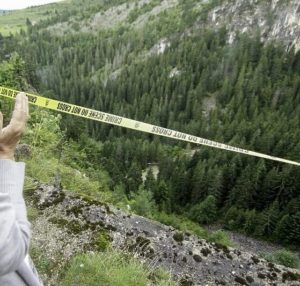
The pain we endured transcended the physical, burrowing deep into our souls. It was a pain that defied words, leaving only a raw and unrelenting ache. As the hours dragged on, I couldn’t help but wonder how humans could inflict such suffering upon one another. The soldier’s demands, the humiliation, the theft—it all seemed like a twisted manifestation of humanity’s darkest aspects.
And then, in the midst of this nightmare, my gaze met his for one final moment. In those fleeting seconds, a world of unspoken emotions passed between us. His eyes held not just the fear and despair that clouded our lives, but also an inexplicable shame—as if we were the guilty ones, as if surviving this ordeal was itself a transgression.
The last stop the convoy made (before reaching our destination) was on Koričanske Stijene on Mount Vlašić. The Serb soldiers pointed their guns at all the men they wanted to take out and kill. “He,” too, was one of the chosen ones. He was seventeen.
The Serb army slaughtered over 250 innocent, unarmed (civilian) men that day.
The rest of us were taken to the other side of the mountain and thrown onto a field of mines…
The memory of that day continues to haunt me, an indelible mark etched upon my soul. The Koričani Cliffs massacre wasn’t just a historical event; it was a canvas of suffering, painted with the hues of fear, anguish, and desperation. Even now, years later, the weight of that day presses upon my heart, a reminder that the scars of such horrors never truly fade.
© Sanela Ramic Jurich. All rights reserved.
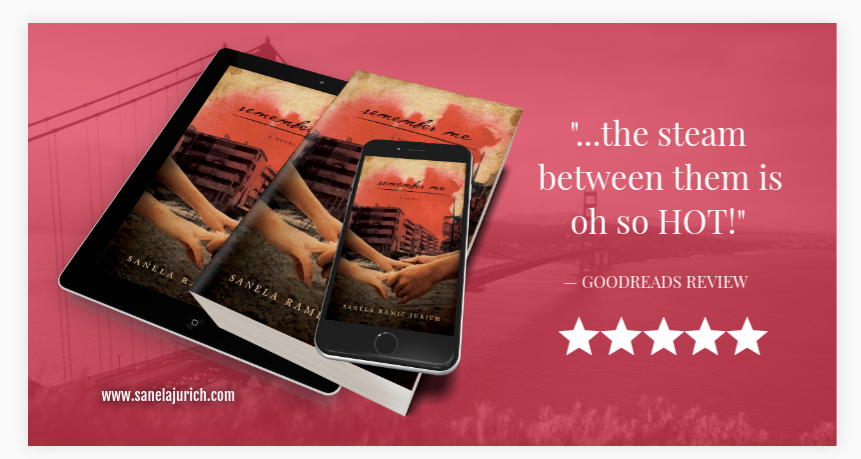
SARAH AND TOM
Once upon a time, there was a couple named Sarah and Tom who had been together for three years. They had met on a blind date that was set up by mutual friends and had hit it off immediately. They were both kind-hearted and adventurous, and loved to explore new places and try new things together.
One year, on March 8th, Sarah and Tom had planned a special day to celebrate International Women’s Day, which was an important holiday for Sarah as she was a strong advocate for women’s rights. They started off the day by attending a march in support of women’s rights and equality.
After the march, they went to their favorite coffee shop and enjoyed a warm cup of coffee while discussing the importance of the holiday and their hopes for the future. Tom surprised Sarah with a bouquet of flowers and a heartfelt letter expressing his love and appreciation for her and all the women in his life.
As the day went on, they decided to take a spontaneous road trip to the countryside. They drove through the rolling hills, stopping at small towns along the way and taking in the beautiful scenery. They found a secluded spot to have a picnic lunch and spent the afternoon laughing and enjoying each other’s company.
As the sun began to set, they found a cozy bed and breakfast to spend the night. They shared a bottle of wine by the fireplace, cuddled up under a blanket, and talked about their dreams and aspirations for the future.
It was a perfect day filled with love, adventure, and meaningful conversations. Sarah and Tom knew that they were meant to be together and that they would always support each other’s passions and goals. From that day on, March 8th became a special day for them, a day to celebrate their love and the power of women.
Hope you enjoyed this short love story. Come back often for more.
Sanela
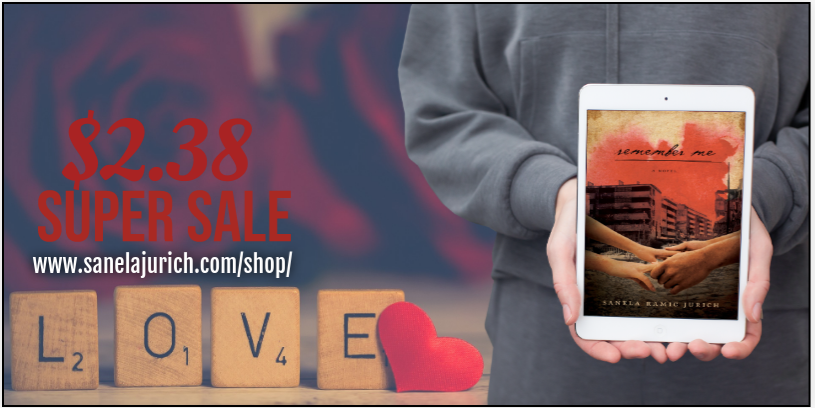
Joan Crawford once said that love is a fire, but whether it is going to warm your hearth or burn down your house, you can never tell and I felt that.
Although the truth behind the Valentine legends is murky, the stories all emphasize his appeal as a sympathetic, heroic and—most importantly—romantic figure.
According to history.com, one legend contends that Valentine was a priest who served during the third century in Rome. When Emperor Claudius II decided that single men made better soldiers than those with wives and families, he outlawed marriage for young men. Valentine, realizing the injustice of the decree, defied Claudius and continued to perform marriages for young lovers in secret. When Valentine’s actions were discovered, Claudius ordered that he be put to death.
Another legend says that an imprisoned Valentine actually sent the first “valentine” greeting himself right before his death, after he fell in love with a young girl—possibly his jailer’s daughter who visited him during his confinement. It is alleged that he wrote her a letter signed “From your Valentine,” an expression that is still in use today.
Valentine greetings were popular as far back as the Middle Ages, though written Valentine’s didn’t begin to appear until after 1400.
READ MORE: Victorian-Era Valentines Could Be Mean and Hostile
…The blue shade of his eyes doesn’t exist anywhere else in any universe. It only exists inside of him and when he’s calm and content, his eyes deepen and darken just a tiny bit. No one else can see it but me. I watch him so closely all the time. I soak him in. His beauty is indescribable to me. I don’t just physically see it; I feel it deeply. I know him so well that the beauty of him–all of him inside and out–overwhelms me. Soulmates. — The story of us
…The sun was setting as they reached the desolate field. Back when they were just teenagers in love, this was their special place. It was a secluded field hidden deep inside of the woods; far, far away from anywhere. That was its beauty. They used to come here often to love, to talk, to laugh, to cry, and to live. — My happy Valentine
Sample:
To purchase, go to Audible.com or visit Amazon.com
I am giving away an audiobook to one special Valentine. To claim your gift, you must email sanela@sanelajurich.com, and I will send you a free code to your own copy of Remember Me. In order to listen, you do not need to have an account with Audible. All you need is your Amazon sign-in information. Claim your code and listen for free!
THE WAITING GAME
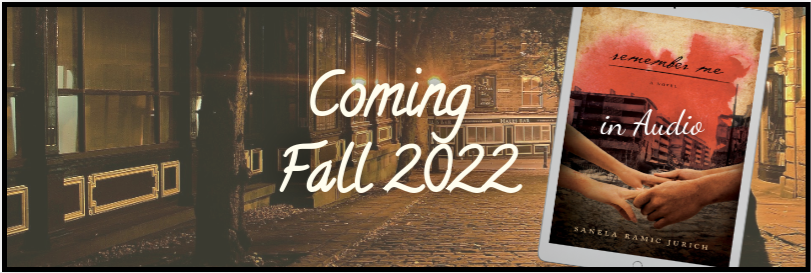

When all the best things feel miles away
Thought I’d pop in for a minute to talk about things worth waiting for.
A little while ago, I shared the exciting news of Remember Me coming out in audio. Even though it was only about a month ago since I shared this news, for some reason, it seems like a lifetime ago since then and I’m slowly losing my patience playing the waiting game.
But what is delayed is not lost and sure enough even waiting will end … if you can just wait long enough.
It’s only a few short days until it’s available for purchase, but until then, here’s a short snippet sample narrated by the talented Lindsay Carrillo. Enjoy.

Both Remember Me and Haunting from the Past are available as an eBook download at a reduced cost and within minutes you can be reading these books on your computer, PDA, cellphone or a stand-alone eBook reader.
I think that’s just about all the news from this desk. Back to waiting on the audio file. Stay tuned!
Sanela

…The blue shade of his eyes doesn’t exist anywhere else in any universe. It only exists inside of him and when he’s calm and content, his eyes deepen and darken just a tiny bit. No one else can see it but me. I watch him so closely all the time. I soak him in. His beauty is indescribable to me. I don’t just physically see it; I feel it deeply. I know him so well that the beauty of him–all of him inside and out–overwhelms me. Soulmates…
SANELA AT HOME, BOYS, THE OUTDOORS
Around here, we’ve got a routine going, and routines always keep me steadier. I’m writing away, and that always keeps me sane. Now I’m working on a prequel to Remember Me—and no! I’m not telling you anything about it yet, except that, It is Sabina and Ivan’s story and it takes place in, you guessed it, pre-and-during war in Yugoslavia. I am not letting the world forget about the genocide they let happen in the early 1990’s Balkans “and that’s all I have to say about that,” as Forest Gump would say.
Other than that, not much is happening in my corner of the world.
Weekends are for cleaning, cooking, baking. Not much gardening this year as herds—and I mean herds—of rabbits gobbled up most of my garden. Nothing stopped them this year. Twice I went out and chased about ten away. They didn’t leave me much except for some cherry tomatoes.
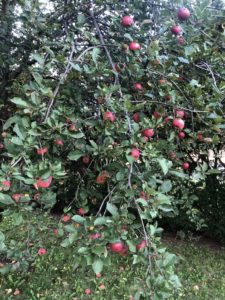
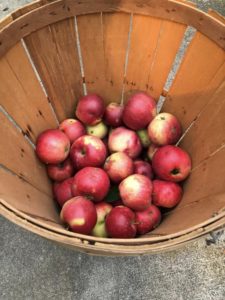 My apple tree, on the other hand, has given me so much produce this year, I’ve harvested, chopped and made all kinds of apple goodies and still there is more to share with squirrels, neighbors and friends.
My apple tree, on the other hand, has given me so much produce this year, I’ve harvested, chopped and made all kinds of apple goodies and still there is more to share with squirrels, neighbors and friends.
Hanging out with my sons is always fun. Even the teenager’s been coming out of his hole more often to hang out with me, which makes me feel so good inside I can barely breathe.
Every time I see his tall figure emerge from his room, I hold my breath and hope for the best.
“Wanna watch a movie or something?” He said to me this Friday night, surprising me so much I almost chocked on a piece of pie I was eating.
“Sure,” I managed to answer calmly, while jumping up and down from joy inside.
We went to Rolling Stones store in Chicago the other day and he purchase a DVD of a movie called The Shining. He wanted to watch and compare it to the book he’s currently reading, The Shining by Stephen King.
Even thought I don’t really like horror movies, I agreed on watching it since he was the one to ask me and I’d do anything for him, even if it means sit down and watch a horror flick by Stephen King. And yes, he also talked me into watching IT with him one time to “face my fears” and cure my phobia of clowns. All I can say about that is that it was a very, very bad idea.
Anyway, we watched the movie and he wasn’t very impressed because, surprise-surprise, it wasn’t like the book, which he’s absolutely in love with.
On Saturday, Denny, my college kid, decided he wanted to cook. We’ve been talking about going to Louisiana on vacation. We wanted to visit various restaurants and try all kinds of exotic foods we never tried before. Denny, being a real foodie, decided not to wait to go to Louisiana to try gumbo, but to look up a recipe online and make it himself. After watching a few tons of videos on You Tube, he came up with his own recipe for a gumbo, which, I must admit, came out surprisingly great. Not one drop was left in that pot and we all wanted more. Maybe next weekend…
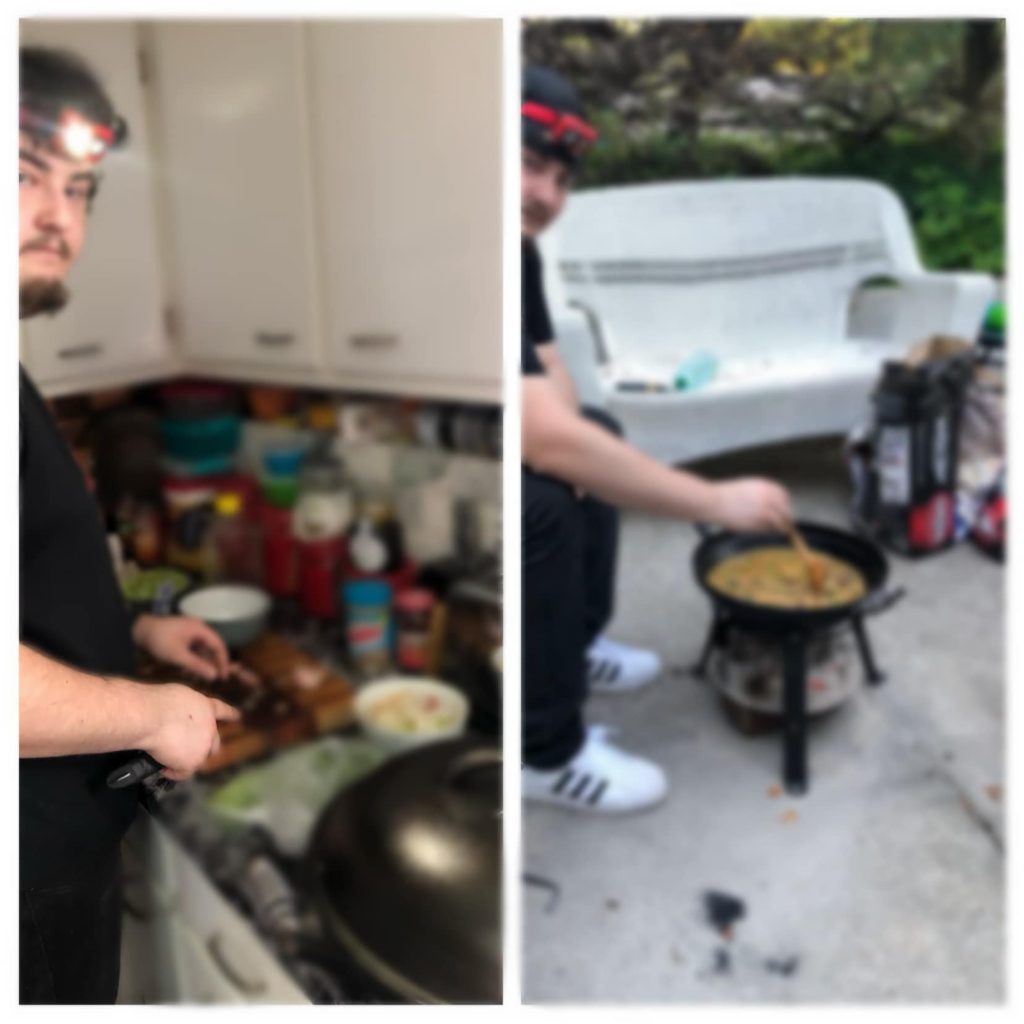
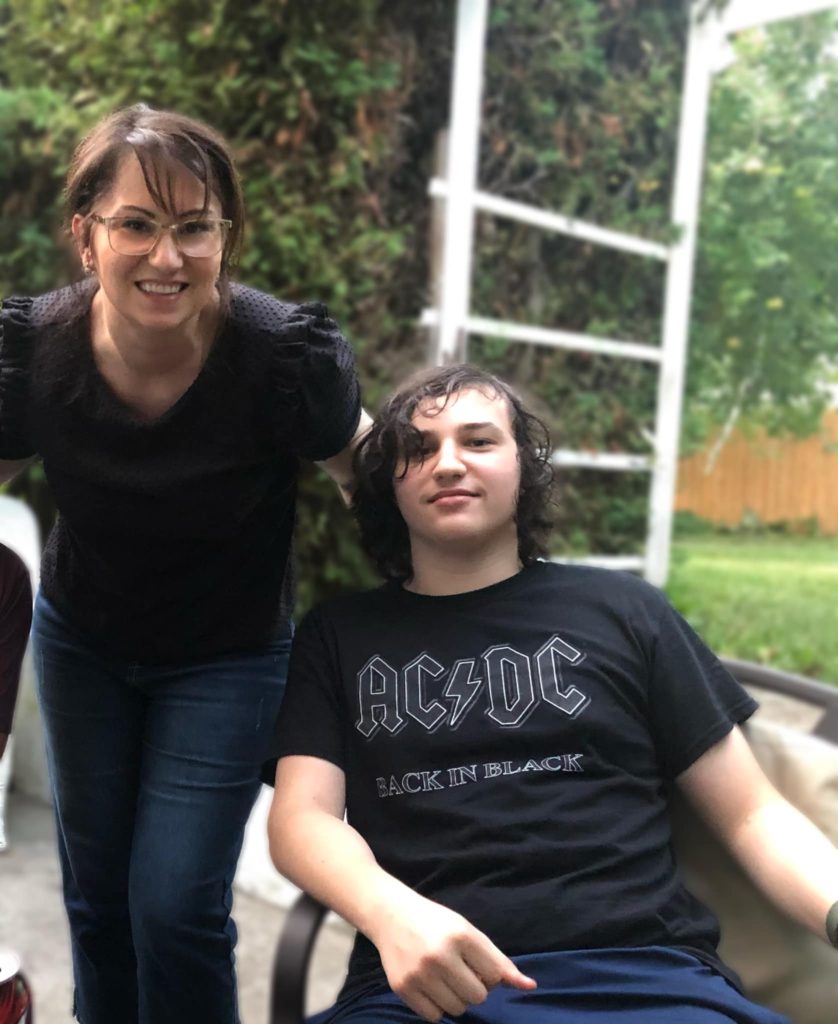
Other than that, we cleaned, mowed the loan, harvested some more apples and decorated for Halloween. I even baked an old fashioned apple cake while they found the time to work on an old Celica they’re not giving up on. Needed a jump and some gas, but it’s still going strong.
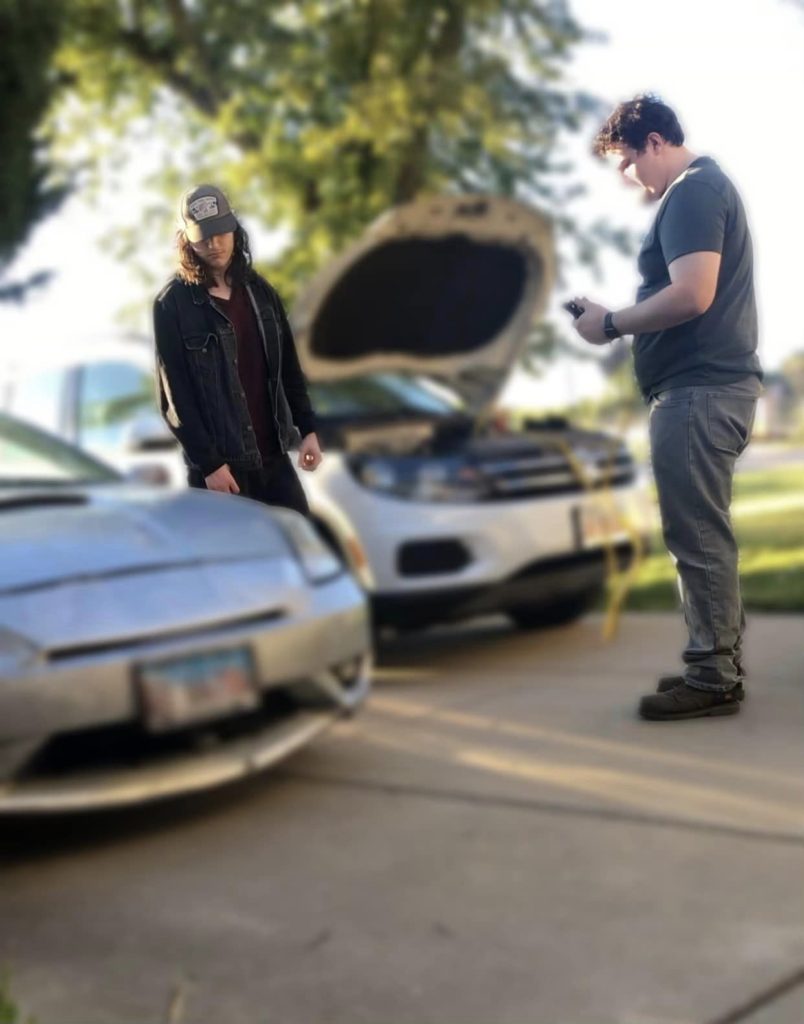
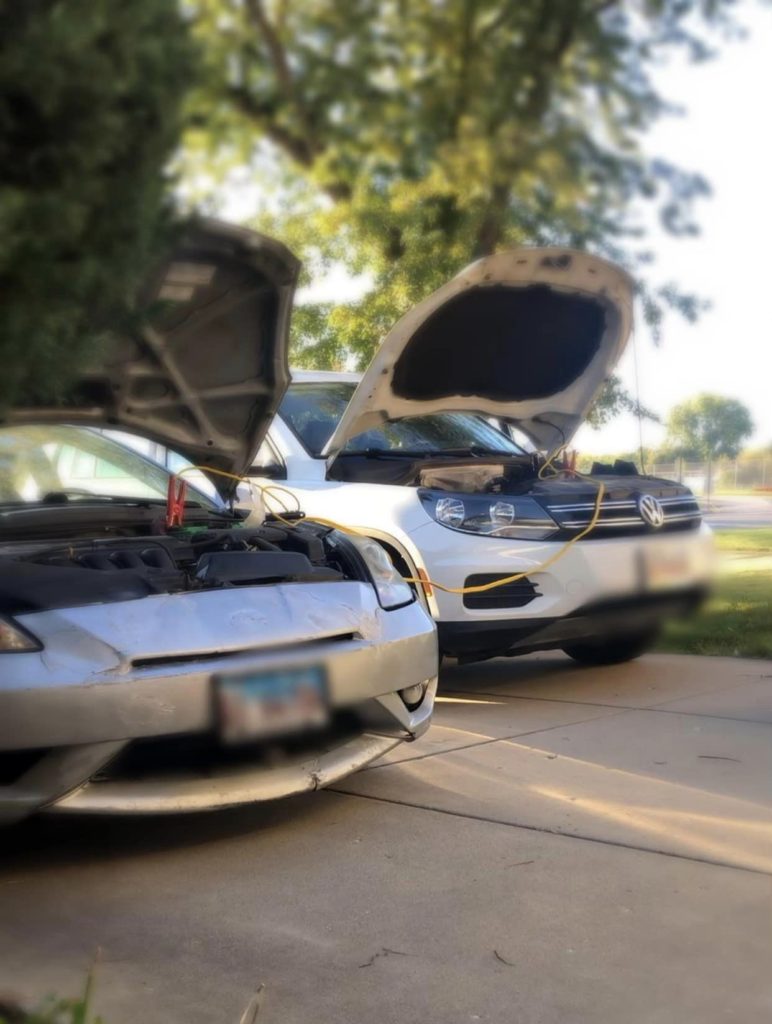
That’s really about it from my home front. I’m going to relax in my clean house for awhile now!
Love always,
Sanela
P.S.
I Forgot to mention how absolutely ecstatic I am about my book, Remember Me, coming out in audio soon. Here’s a short audio snippet for you. Enjoy!
There’s something to be said about finding someone who just gets you. There’s really nothing like it. Finding that person is the same feeling as coming home. You just feel comfortable. You feel like you can relax and be who you really are. They’re exactly what you’ve been missing.
As I contemplate about which story to write about today, I am feeling lonely. I am feeling betrayed by someone I love. I am feeling confused and scared. I am feeling … blah, and so, what I need today is some Johnny-therapy. Every time I get betrayed by someone I love, I go back to the memory of him to remind myself that it is possible to be loved by someone so completely that you don’t have to censor what you say around them because they get you and they love you anyway. You can be as goofy as you want around them and they will love you anyway. You can cry and fall apart in-front of them and they will still love you anyway … finding a person like that is rare.
For me, a little Johnny therapy is what’s desperately needed this weekend. It’s what’s necessary to get me through to the next chapter of my life. So, instead of coming up with a new inspirational story to tell you today, I am bringing Johnny back to life instead.
Here’s a short excerpt from my favorite book.
Enjoy!
Copyright © 2022 by Sanela Ramic Jurich. All rights reserved.
Pg 205-207 in Remember Me
The door to his office was open, and as I walked in, I saw this tall, handsome, blond man holding the phone to his ear and talking loudly. There was a faint accent in his voice. He had his back turned to me, but his voice was enough to tell me it was him. It was my Johnny. I couldn’t stop the tears from embarrassing me; they flew out of my eyes like rivers before he even turned to face me. I felt like I was about to have a heart attack. My mind was telling me it was impossible and that I was finally losing it, but my heart – my heart was humming, slowly wrapping around his voice, soaking it in, treasuring it. He turned… slowly dropping the phone to the floor. Shock was all over his face as he just stood there, obviously stunned. The sight of him made me catch my breath. Though his blond hair was now expertly trimmed, and his body had filled out; he still had the most mesmerizing blue eyes I’d ever seen, looking even more like a god than before. I noticed the one dimple he had when he smiled. His one flaw – a dimple on only one side, his left. To me it wasn’t a flaw at all; it just made him look even more adorable.
“Selma,” he whispered, as if he was afraid if he spoke louder or moved I’d suddenly disappear. I couldn’t say anything from fear of sobbing loudly, so we just stood there looking at each other, neither one making the first move for a few moments. Then, finally, he walked gradually toward me. The nightmare I’d had for years popped into my head, and I thought to myself that if this was another tribulation and he suddenly disappeared, I’d die. My heart would break, and I wouldn’t recover from this one.
“Selma,” he repeated softly, finally reaching me.
“Hi…” was all I could whimper out as my whole body trembled, mostly from the closeness of him and a little from the shock it just went through. The hug he gave me was soft at first, but it became stronger and stronger with each passing second. His arms were wrapped around me tightly; I thought he’d break my rib cage, but I didn’t mind if he did. I wanted him close, closer. I was afraid if I let go, I’d never be able to hold him like that again. I had millions of questions on my mind and knew nothing about this grown-up Johnny. For all I knew he was happily married. Oh, how I hoped he wasn’t.
Selfish–I was so selfish to hope that….
Hope this short excerpt brightens up your day a little. It’s certainly putting a smile to my face.
Thanks for hanging out with me.
Love always,
Sanela
As my birthday approaches, so does my anxiety. Not for the reasons one might think. I’m not afraid of getting old or dying. I’ve faced death more times than I can count and it no longer scares me. It taunts me at times though. When I wish for it and beg for it to come and end the misery, it laughs in my face. It squeezes so hard sometimes, it feels like my soul is about to leave my body. Then it eases its grip on me as it grins and whispers: no, not just yet, you haven’t suffered enough yet. There are more lessons to be learned, still.
No, death does not cause my anxiety any more. Death feels like a sweet release. Freedom. My anxiety is caused by life and the evil that exists in it. In my experience, birthdays are reminders of the evil that plagues the human nature.
Someone once said to me that birthdays are a celebration of sheer privilege of being alive and, although, I truly am grateful for all the years of life I’ve lived after my sixteenth birthday, I still can’t escape this immense ache in my heart that seems to be getting stronger with each passing year; every single year my birthday rolls around.

The day I left my home country forever was August 26, 1992. It was my sixteenth birthday.
As I stood on the street, waiting for a bus to take me away to an unknown hell, I was feeling ashamed of my own thoughts. I was brooding over my birthday. I was being a typical sixteen-year-old; a teenager. I wanted a birthday party. I wanted my friends and family to fuss over me. I wanted the sweet in the “sweet-sixteenth.” Why could’t I have all that?! Why was I being robbed of that?! For whom?! Instead of getting a birthday party, I was being forced out of my home. Being forced to watch as evil men killed my family, friends, neighbors. Being forced out of my freedom! Had to stay quiet as they called me names and tried to touch me inappropriately — had to let them do it! Had to keep quiet as they stole every single possession my parents and I owned. Why?! For whom?! For what?!
Five days before … August 21, 1992, I was in a convoy that was transporting me from my home-town, Prijedor to Travnik. It was supposed to be a safe passage, but half way to our destination, the Serb army stopped the convoy, forcing over 250 men and boys out of it and killing them in a place called Koričanske Stijene on Mount Vlašić. The rest of us were taken to the other side of the mountain and thrown onto the field of mines. (Read Remember Me).
The walk down the mountain was very long and tiring. My mom tripped and fell so many times … I had to pee so badly, I could barely walk. When it got dark out, we weren’t allowed to turn on any flashlights because if we did, the Serb army could see us. They were already throwing grenades over our heads, trying to guess where exactly we were. I remember some guy lighting a cigarette and three other men jumping up and tackling him to the ground. The cigarette was going to give our whereabouts away.
When we left home, we took nothing with us. We had no money and no belongings. All was taken away. (Read Remember Me).
And so I just stood there — at the bus-stop — hopelessly. Feeling as if someone had dumped a bucket of manure on my head. Feeling guilty for wanting something better for myself on my birthday as if I hadn’t just witnessed a mass murder take place only five days before.
My mom, noticing the look on my face, leaned closer and whispered: “Sanela, you’re alive. We’re alive. Isn’t that something to celebrate? We’re leaving hell on your birthday. That’s something, isn’t it?”
I stood quiet as her words made me feel worse, not better as she intended.
I felt hatred, but not toward the men who forced us out of our home, but toward myself. I wasn’t good enough to have a party. To celebrate my sweet sixteenth like all the other kids my age did and at the same time, I felt guilty for even wanting it now while all this misery was going on around me.
“It could be worse,” she continued. “We must hope for the best, but prepare for the worst.”
“What do you mean it could be worse?!” I snapped, “why do you always have to say that?! How about this, from now on you say, it could be better! Huh?! Maybe then it’ll start getting better, not worse!”
I turned my back to her, not wanting to talk any more. I felt even worse than before. I realized I had hurt her. She was only trying to make me feel better. She didn’t know anything either. She didn’t want this for me, I knew, but she was an easy target for me to take some frustration out on. She forgave me, I’m sure. She probably doesn’t even remember those words spoken in so much pain, but I do and I still feel guilty for dragging her down to that hell with me as if she didn’t have enough to deal with herself.
A few minutes later, I heard someone calling my name. Turning around I noticed a boy a couple of years older than I, whom I’d just met a day before, running to catch up as the bus we were waiting on slowly approached.
He was out of breath when he finally reached me. Almir was his name. I only remembered him because when he had introduced himself the day before, I’d noticed a hole in his forehead. It looked as if someone had scooped up half of his forehead and covered the hole with skin. After he had introduced himself, we had talked for a little bit. He had explained to me that the hole in his head was created by a shrapnel from a grenade that fell on his house killing his mother and two sisters.
It could be worse. My mom’s words rang in my head as I watched him approach.
“I have something for you,” he said earnestly, “Happy Birthday.”
He handed me something wrapped up in newspaper. “Don’t open it just yet. Wait until I’m gone.”
My voice was filled with emotion as I asked how he knew it was my birthday.
“Your cousin told me last night,” he smiled, “although it’s not much, it’s something to remind you you’re not alone. Be happy on your day Sanela,” he smiled sadly adding, “birthdays are a celebration of privilege of being alive and that’s what we are. Alive. We get to live another day. To meet some new people. To love. If nothing else, then to see what happens next.”
I’ve lived by those words every day of my life since, always wanting to see what happens next.
And so, as my 46th birthday approaches, I am thrilled to report that I am better than ever. It took me a while to get here, but here I am, basking in awesomeness. Despite everything, I came out beautiful and strong.
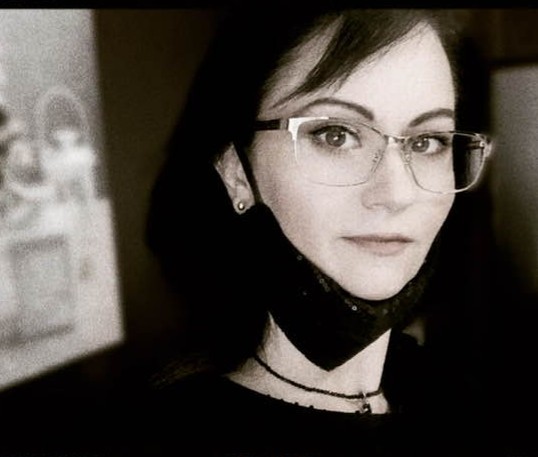
Cheers to the next 46!
Sanela

“I truly believe that I survived for one reason and one reason only: to tell our story, to give a voice to those who don’t have it anymore. I was there as a witness. As a survivor, I have an obligation. I have to talk about what had happened in Prijedor, Bosnia back in 1992, no matter the cost!” ~Sanela Ramic Jurich
Have you ever met someone for the first time and felt like you’ve known them forever? Against all odds, you know deep inside that you know them. They feel familiar and comforting. You are drawn to them, but you only just met them. How can that be? Could it be some kind of a karmic connection? Soulmates? Is such a thing even possible? Could it all be just a figment of your imagination or could there be an actual rational explanation for feeling this way? Is there a scientific explanation or is it fate?

The Story of Us by Sanela Ramic Jurich
Another gorgeous summer day. I shouldn’t be surprised by that; days here are always gorgeous. It’s summer all the time. The only time it rains and is gloomy is when we have an argument. He pulls the anger out of me. He knows which buttons to push, and he pushes them well. He understands the extent of effect he has on me. He’s the only one who can bring the storm, lightning, darkness, rain … out of me. It never lasts, of course, but it shows the power he has over me and he loves it. Oh, I’m sure I have the same effect on him too, but men can’t bring out the storms with their emotions like women can. Men can only walk away and hide. He hides in his man-cave until the storms of his emotions die down and then he comes back out looking more handsome than before; if that’s even possible. His smile can light up an entire universe. He is warm and inviting. The blue shade of his eyes doesn’t exist anywhere else in any universe. It only exists inside of him and when he’s calm and content, his eyes deepen and darken just a tiny bit. No one else can see it but me. I watch him so closely all the time. I soak him in. His beauty is indescribable to me. I don’t just physically see it; I feel it deeply. I know him so well that the beauty of him–all of him inside and out–overwhelms me. Soulmates.
We’ve known each other a long time. Ions. I don’t even remember the first time I laid eyes on him. We must have been created at the same time. Each lifetime we lived, we lived it together: learning and growing, driving each other mad at times too, but always ending up here; back home. He’s my opposite. There’s no me without him.
Our home is created for the two of us. That’s where we go after each life-time. No matter where we end up in life, or whom we end up with, once it’s over, we retire here.
The house itself is not huge nor fancy looking. A small cottage over a big mansion was my idea. He went along with it because of the promise I made: I would let him rebuild it any way he liked if he wasn’t satisfied with the way it looked now. Later, however, he admitted he loved it too.
The house is white. Brown shutters on windows and the oval door with an old-fashioned knocker in the middle of it are brown too. The roof is red and peaky. Multi-colored flowers are everywhere in the front. Red roses are climbing up the house and their scent is alluring. The front yard is cozy and is covered in freshly cut grass surrounded by a picket fence. The fence is not white, but natural color of the wood it was made of. There’s a path passing by the house. Across the path is a waist-size wall and behind it–in its entire glory–is the ocean. Oh, the smell in the air is captivating. Even though the sound of the waves hitting the rocks is loud, it gets drowned out by birdsong, an occasional bee buzzing, a bark of a dog, a horse neighing somewhere in the distance … but the best part about the surroundings here is that no noise is ever caused by a car, train, airplane. There are no neighbors in sight, but we know they are nearby if we need them.
To the left of the house, the dirt path leads to a green hill. It takes some effort to climb it, but once up there it feels like an accomplishment. The view of the ocean–once on top–is spectacular and is well worth the climb. There are no fences there. Walking down the hill in the opposite direction, leads to a white, sandy beach. The beach is vast. Lots to explore. Caves and a small forest are not too far away either.
This particular evening, we went out for a walk. We climbed up our hill and laid down our blanket so we could have a picnic. Even though we don’t need to eat here, we still do it. We love the comforting taste of food and wine. We teased and made each other laugh until our bellies ached. We talked for hours and hours like we usually do. We lost track of time and before we knew it, we were blanketed by the night. Night creatures were slowly coming out of their hiding places and were making noises. It felt like there was something heavy in the air though. Couldn’t put my finger on it; couldn’t truly understand the feeling. He seemed somewhat different. I could tell there was something he wanted to talk about but was struggling to find the right words. The worry written on his face he was trying to conceal was overwhelming.
“What is it?” I asked slowly, even though I dreaded the answer. I, as an empath, was soaking up the emotion he was feeling right now, and it felt like his nerves were getting the best of him. He was worried about my reaction. He was worried I would say no.
He looked deeply into my eyes as if he was trying to see what my answer would be. Not able to read me, he groaned, then whispered: “Let’s do it! I’m ready to go again!”
I didn’t have to ask to know what he meant. I instantly knew what it was he wanted to do again. It was not something I ever look forward to doing because that something terrifies me. Each time we did it in the past, he was the one who insisted. He was the one who initiated it and even though I was reluctant to do it, each time he asked, I always said yes, but I only agreed to it because of his promise to be close. To keep me safe. Continue reading →
